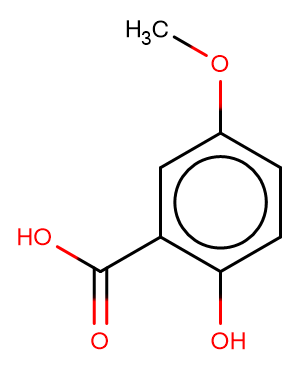
5-Methoxysalicylic acid
CAS No. 2612-02-4
5-Methoxysalicylic acid( 5-MeOSA )
Catalog No. M20566 CAS No. 2612-02-4
5-Methoxysalicylic acid is a natural product used as a useful matrix in the MALDI MS analysis of oligonucleotides when combined with spermine
Purity : >98% (HPLC)
 COA
COA
 Datasheet
Datasheet
 HNMR
HNMR
 HPLC
HPLC
 MSDS
MSDS
 Handing Instructions
Handing Instructions
| Size | Price / USD | Stock | Quantity |
| 100MG | 37 | In Stock |


|
| 200MG | Get Quote | In Stock |


|
| 500MG | Get Quote | In Stock |


|
| 1G | Get Quote | In Stock |


|
Biological Information
-
Product Name5-Methoxysalicylic acid
-
NoteResearch use only, not for human use.
-
Brief Description5-Methoxysalicylic acid is a natural product used as a useful matrix in the MALDI MS analysis of oligonucleotides when combined with spermine
-
Description5-Methoxysalicylic acid is a natural product used as a useful matrix in the MALDI MS analysis of oligonucleotides when combined with spermine.
-
In Vitro——
-
In Vivo——
-
Synonyms5-MeOSA
-
PathwayOthers
-
TargetOther Targets
-
RecptorOthers
-
Research Area——
-
Indication——
Chemical Information
-
CAS Number2612-02-4
-
Formula Weight168.15
-
Molecular FormulaC8H8O4
-
Purity>98% (HPLC)
-
SolubilityDMSO:34 mg/mL (202.2 mM)
-
SMILESCOc1ccc(O)c(c1)C(O)=O
-
Chemical Name——
Shipping & Storage Information
-
Storage(-20℃)
-
ShippingWith Ice Pack
-
Stability≥ 2 years
Reference



-
Antroquinonol
Antroquinonol is a ubiquinone derivative from Antrodia camphorata with anti-inflammatory and anticancer activities.Antroquinonol reduces oxidative stress and inhibits inflammation and sclerosis in mice with focal segmental glomerulosclerosis through enhancement of the Nrf2 signaling pathway.
-
Eupatoriochromene
Eupatoriochromene retard seed germination , reduced radicle and hypocotyl growth of weed and crop plant seedlings and increased adventitious root formation of mung bean cuttings. Eupatoriochromene has insecticidal activity, it exhibits toxicity againstCulex pipiens (house mosquito) larvae andOncopeltus fasciatus (large milkweed bug) nymphs.
-
Sulforhodamine 101
Sulforhodamine 101 is a red fluorescent dye.



 Cart
Cart
 sales@molnova.com
sales@molnova.com


